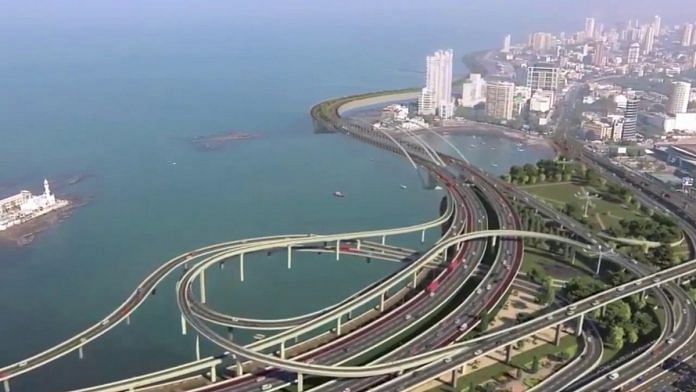Mumbai: The Bombay High Court’s order Tuesday setting aside the Coastal Regulation Zone (CRZ) clearance for the showpiece Mumbai coastal road project may not only delay the project, but also bring it back to the drawing board.
Unless it gets a Supreme Court reprieve, the Brihanmumbai Municipal Corporation (BMC), the implementing agency of the project, will not only have to halt work on the project, but also start proceedings for a fresh CRZ clearance as well as seek an environment clearance for the coastal road, proposed to be built by reclaiming land from the sea and on stilts.
A senior BMC official said, “We made a strong case in the high court. But, since a few of the points were not considered, we will be filing a petition in the Supreme Court.”
Another civic official, who did not wish to be identified, said, “Unless we get a reprieve from the Supreme Court, the high court order can have a severe impact on the project. At the very least, it will set the project back by a minimum of six months.
“The worst case scenario could be that the BMC will have to consider design changes too in the course of getting a fresh CRZ and environment clearance.”
The entire coastal road will stretch 29.2 km from Nariman Point in South Mumbai to Kandivali in the western suburbs, and is touted to change the way Mumbai commutes, decongesting the western suburbs.
In October 2018, the BMC started work on the first phase from South Mumbai till the Worli end of the Bandra-Worli sea link, estimated to cost Rs 12,721 crore.
Originally, the BMC hoped to complete the first phase of the coastal road by 2022.
The civic official added, “Contractors had mobilised machinery. We had started the reclamation process at a few places. In percentage terms, we can say about 4-5 per cent of the work has been done until now. The order will also have a financial impact for the contractors.”
CRZ clearances illegal: High Court
A bench of Chief Justice Pradeep Nandrajog and Justice N.M. Jamdar upheld the 30 December 2015, notification amending the CRZ norms to allow reclamation for roads in exceptional circumstances. However, it said the clearances granted by the Maharashtra Coastal Zone Management Authority (MCZMA) and the expert appraisal committee of the Union Ministry of Environment and Forests were “illegal” and quashed them.
“We further declare that MCGM (the Municipal Corporation of Greater Mumbai, also referred to as the BMC) cannot proceed with the works without obtaining an environment clearance,” the judges said in the order Tuesday.
The bench said the MCZMA did not even bother to record objections from non-government organisations, and while the Environment Impact Assessment recorded the objections and noted the stand of the BMC, “it gave no reasons much less returned findings on the objections and the response of MCGM”.
The order said there was a lack of proper scientific study while granting approvals.
The high court passed the order while hearing petitions by a bunch of environmental organisations and a group of fishermen at Worli who are to be affected by the project.
Also read: Mumbai mayor’s ‘no water-logging’ comment sparks debate on ‘accountable’ officials
Coastal road project history
The previous Congress-Nationalist Congress Party (NCP) government had proposed the coastal road project as an alternative to an expensive network of sea links to connect Mumbai’s south to its western suburbs in 2011.
The project, however, seemed like a perpetual non-starter as it involved reclaiming land, prohibited under Coastal Regulation Zone norms, as well as due to concerns over the adverse effects of reclamation.
Mumbai was built by reclaiming land to connect its seven islands.
The project was stuck until 2015 when the Union Environment Ministry agreed to amend norms after a meeting between Fadnavis and Environment Minister Prakash Javadekar.
Clearances
The Environment Ministry first considered the project proposal for a CRZ clearance in July 2016 after the MCZMA accorded it a CRZ clearance.
However, it sent the proposal back pointing out basic flaws — the lack of a disaster management plan, issues with some environment impact reports and no approval from the state and central pollution control bodies and the Coastal Regulation Zone (CRZ) maps. It also said that the proposal failed to highlight the exceptional circumstances for a grant of a clearance for reclamation.
The BMC then changed tack and submitted a revised proposal to the MCZMA in October 2016, limiting it to the first phase. As per the civic body, 90 hectare land will be reclaimed in this phase of which only 20 hectare will be used for the road while the rest for parks, cycle lanes, jogging tracks, parking for buses and so on.
The Environment Ministry granted the final CRZ approval in May 2017.
Also read: Mumbai rains: Is BJP-Shiv Sena govt going for showpiece infrastructure ignoring basic issues?




Projects of this magnitude and potential impact on the environment ought to be subjected to the most minute examination. The fact that it is a public project – as in the case of construction of Metro sheds in Bombay’s green lung – cannot override the valid concerns that led to enactment of the complex web of CRZ regulations. These date back to 1991, before climate change, global warming and rising sea levels became part of the public discourse. The Ministry of Roads is equally dynamic when it comes to cutting down scores of thousands of fully grown trees. Rules rigidly enforced for private projects are considered dispensable, with a meeting sufficient to clear all doubts.